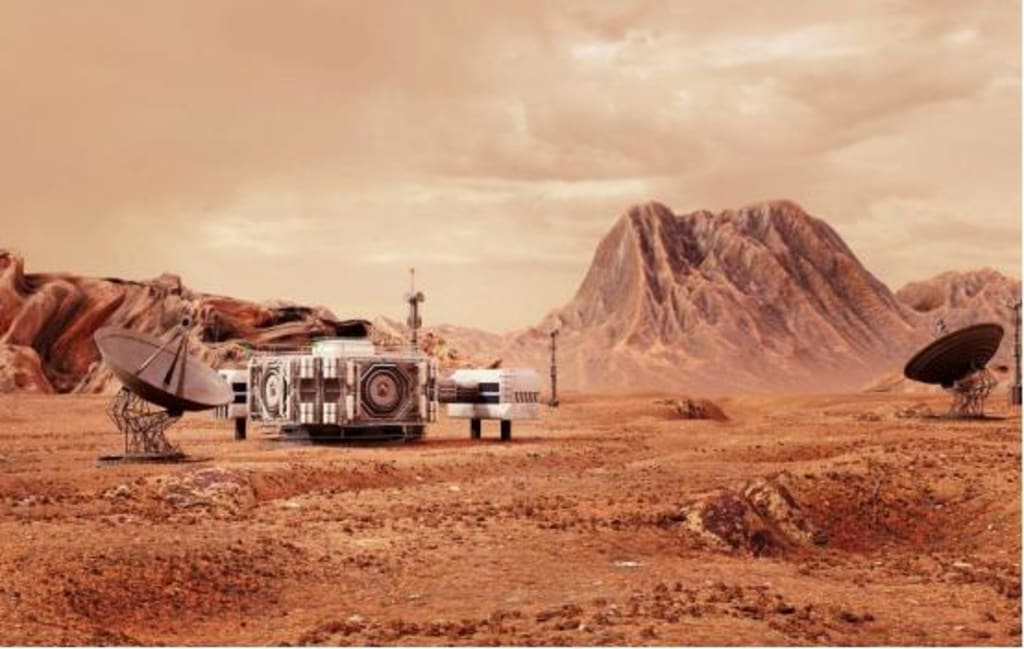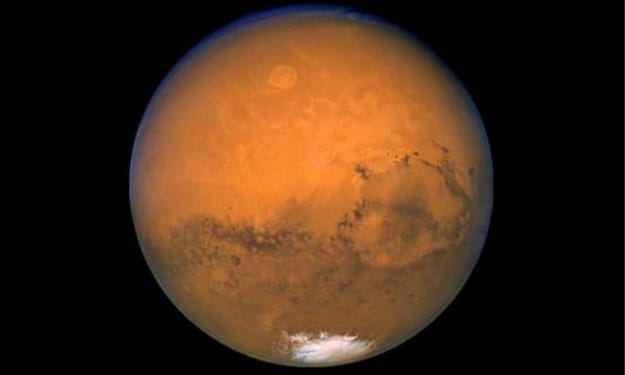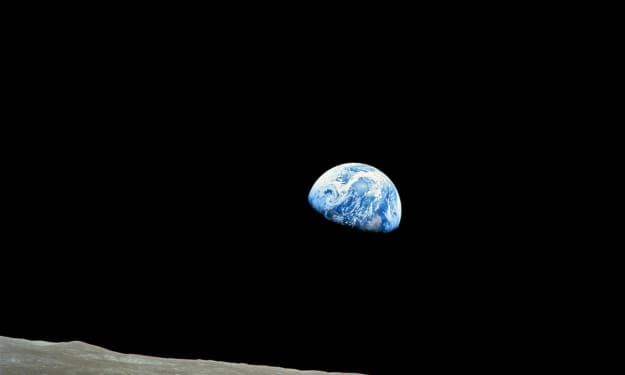Did multiple civilizations exist in our solar system? Scientists say there was a nuclear war 500 million years ago, is it true?
Did multiple civilizations exist in our solar system?

Many people are curious about one question: why is life on Earth the only one in our solar system, when there are three habitable planets?
According to modern scientific research, the climate on Venus and Mars was much better than it is today, which means that the high temperatures on Venus and the low temperatures on Mars are in fact not normal.
A nuclear war in the solar system 500 million years ago?
The man who claimed to be from Mars and said that the planet was already home to a very advanced high-tech civilization hundreds of thousands of years ago is the "boy from Mars".
At that time, even Homo sapiens, the direct ancestor of modern humans, had not yet appeared on Earth, and the primitive humans on Earth were still living a life not very different from that of the animals, so it is clear that intelligent life on Mars emerged at least a few million years earlier than on Earth.
Interestingly, modern scientific research has found that Mars was probably the first habitable planet in the solar system at the beginning of the solar system, and that 4.1 billion years ago, when the Earth was still a "plutonic" period, Mars was already habitable and may even have been alive.
But then the habitability of Mars suddenly disappeared, and the planet became increasingly desolate, until today it looks like a cold desert.
The same is true of Venus. Researchers have found that a habitable period appears to have existed on Venus until hundreds of thousands of years ago, leading many to speculate that intelligent life may have existed on Venus.
In particular, in the 1980s, NASA probes on the surface of Venus photographed many artefacts that appeared to be urban ruins and a large number of pyramids, leading many to suspect that a civilisation may have existed on Venus before the greenhouse effect exploded for some reason, leading to its destruction.
So, which other cause was there? If life did exist on Venus and Mars, and if there were civilisations in the solar system long before human civilisation emerged, what was the reason for their disappearance?
A researcher has come up with a very bold conjecture: a nuclear war is suspected to have taken place in the solar system. The researchers believe that there was a nuclear war that destroyed the first civilisations in the solar system and left Mars and the planet in its present state.
So, what evidence do scientists actually have? Over the past 40 years or so, since human probes first landed on Mars, the understanding of the planet, has grown.
Some scientists have said that through the data returned by the probe, it was found that there are a lot of radioactive elements on the surface of Mars, and through research, it was found that the levels of these radioactive elements, far exceed the natural standards, which means that the formation of these radioactive elements on Mars, in fact, has nothing to do with natural factors, and generally speaking, only a nuclear weapon explosion, which would produce such a huge power.
The fact that Venus, as we mentioned above, is also unusual in that, although it is closer to the Sun, it is not supposed to have such high temperatures or such a harsh internal environment, and the fact that there is not even a single moon around Venus, and that it rotates in a different direction from the other planets, has led some researchers to suspect that Venus may have had suffered a very violent attack.
So, if there was a nuclear war in our solar system, who were the two sides in it? Researchers believe that there are about two possibilities.
Who fought in the solar system 500 million years ago?
Researchers say that chronologically, this nuclear war in the solar system took place about 500 million years ago. If this war really exists, there are about two possibilities for the two warring parties: the first, a war between civilizations inside the solar system; the second, a war between civilizations inside the solar system and civilizations outside the solar system.
Let's look at the first one first. According to our current knowledge of civilisation development, according to Kardashev's civilisation hierarchy, after a civilisation has reached a certain stage of development, the various resources on its home planet are, in fact, no longer sufficient for its sustainable development; to put it bluntly, there are not enough resources, so in order to obtain more resources, it needs to look beyond its home planet, that is, in its own star system, to find new resources.
At this stage, for example, humans are already looking to mine space resources because of the increasing depletion of Earth's resources, and some time ago researchers also said that if all goes well, humans will start mining in space by the middle of this century, which means that humans will also plan to get resources from other planets.
What if there were multiple civilisations in the solar system, all with the same idea of getting resources from other planets? The answer is competition, which means that whoever can get more resources, given a fixed amount of resources, can become more powerful.
So if there were more than two civilisations in the solar system 500 million years ago, then these civilisations would have fought a 'war for resources' between themselves to obtain more resources, and thus both would have been defeated in a galactic war in the solar system, and eventually the civilisations would have been destroyed.
Of course, there is another possibility that 500 million years ago, there was intelligent life in the solar system, but it did not have the ability to leave its home planet and start a solar system war, and originally developed on their respective planets in silence, but unexpectedly discovered by civilizations outside the solar system.
So, after an aggressive extrasystemic civilization discovered the existence of intelligent life in the solar system, it began to invade the solar system, thus the two sides with disparate strengths directly caused the living planets in the solar system to lose their vitality and the first generation of civilizations in the solar system, as a result, to destruction.
However, this extrasystemic civilization was not interested in the resources of the solar system, and of course, it is possible that in their eyes, the resources of the solar system had no value at all, they just wanted to destroy the inferior civilizations in the universe, and so, after destroying the early civilizations of the solar system, this extrasystemic civilization also left.
Researchers believe that the Cambrian explosion of life on Earth may in fact also be related to this galactic war, which apparently devastated the solar system regardless of who the warring parties were, so that the eventual survivors dropped the remnants of the fires of life on Earth, which inexplicably led to an explosion of life on Earth more than 500 million years ago, followed by a radical move further and further towards complex life .
Seems like a big brainwave, doesn't it? So let's ponder another question: have other civilisations really existed in our solar system? Or do aliens really exist beyond our solar system?
Are humans really not the only civilisation in the universe?
Although at this stage, humans have never found any life outside the Earth, just because they haven't doesn't mean it doesn't exist. The universe is too big after all, and our solar system is as small as a speck of dust in a vast universe.
At this stage, scientists can only tell that there was a habitable period on both planets, including Mars and Venus, but how long it lasted and whether intelligent life evolved still needs to be studied further.
It is worth mentioning that although humans may have been the only civilisation in the solar system, from a cosmic perspective, they are definitely not the only civilisation in the universe, and it is likely that an alien civilisation has already discovered the solar system and visited it.
In 1988, the Soviet Union launched two Mars probes, both of which were "ill-fated" or, to be more precise, even "bizarre".
Firstly, the first rover, the Fubos 1, which disappeared without a hitch on its way to Mars, and to this day, no one has found out where it is, as if it had never existed.
Seems pretty incredible doesn't it? However, another mission to Mars, Fubos 2, which reached Mars without any problems, also suddenly lost contact with the Earth after orbiting the planet for more than 2 months.
You may think that the loss of Fubos 2 may be related to a malfunction, but before the loss, Fubos 2 had taken a set of photos and sent them back to Earth, between the Martian moon --The spacecraft hovered beneath Phobos.
In short, Fubos 2 has photographed a UFO around Mars, and according to information released at the time, the UFO is a "cigar" shaped spacecraft about 25 kilometres long.
The UFO is a "cigar"-shaped ship, about 25 kilometres long, hovering around Mars and Venus. What do you think about this? Do you think an alien civilisation exists and would pose a threat to humanity?
About the Creator
Vicky
The world is so wonderful, let's get to know the world together!
Enjoyed the story? Support the Creator.
Subscribe for free to receive all their stories in your feed. You could also pledge your support or give them a one-off tip, letting them know you appreciate their work.






Comments
There are no comments for this story
Be the first to respond and start the conversation.